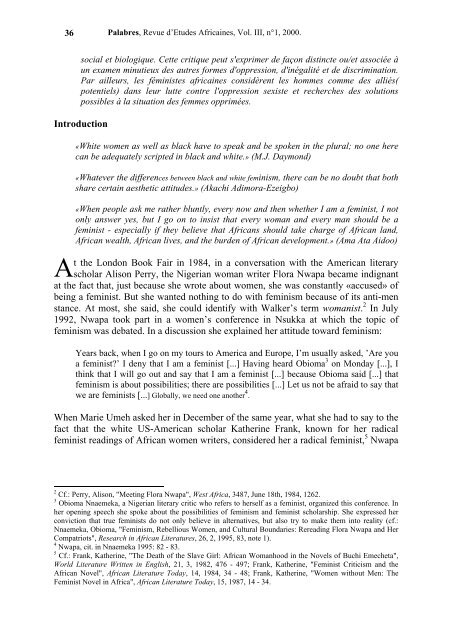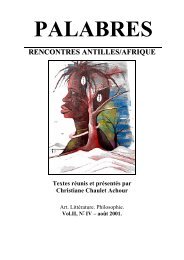Télécharger - Revue Palabres
Télécharger - Revue Palabres
Télécharger - Revue Palabres
Create successful ePaper yourself
Turn your PDF publications into a flip-book with our unique Google optimized e-Paper software.
36<br />
<strong>Palabres</strong>, <strong>Revue</strong> d’Etudes Africaines, Vol. III, n°1, 2000.<br />
social et biologique. Cette critique peut s'exprimer de façon distincte ou/et associée à<br />
un examen minutieux des autres formes d'oppression, d'inégalité et de discrimination.<br />
Par ailleurs, les féministes africaines considèrent les hommes comme des alliés(<br />
potentiels) dans leur lutte contre l'oppression sexiste et recherches des solutions<br />
possibles à la situation des femmes opprimées.<br />
Introduction<br />
«White women as well as black have to speak and be spoken in the plural; no one here<br />
can be adequately scripted in black and white.» (M.J. Daymond)<br />
«Whatever the differences between black and white feminism, there can be no doubt that both<br />
share certain aesthetic attitudes.» (Akachi Adimora-Ezeigbo)<br />
«When people ask me rather bluntly, every now and then whether I am a feminist, I not<br />
only answer yes, but I go on to insist that every woman and every man should be a<br />
feminist - especially if they believe that Africans should take charge of African land,<br />
African wealth, African lives, and the burden of African development.» (Ama Ata Aidoo)<br />
t the London Book Fair in 1984, in a conversation with the American literary<br />
scholar Alison Perry, the Nigerian woman writer Flora Nwapa became indignant<br />
at the fact that, just because she wrote about women, she was constantly «accused» of<br />
being a feminist. But she wanted nothing to do with feminism because of its anti-men<br />
stance. At most, she said, she could identify with Walker’s term womanist. 2 A<br />
In July<br />
1992, Nwapa took part in a women’s conference in Nsukka at which the topic of<br />
feminism was debated. In a discussion she explained her attitude toward feminism:<br />
Years back, when I go on my tours to America and Europe, I’m usually asked, ’Are you<br />
a feminist?’ I deny that I am a feminist [...] Having heard Obioma 3 on Monday [...], I<br />
think that I will go out and say that I am a feminist [...] because Obioma said [...] that<br />
feminism is about possibilities; there are possibilities [...] Let us not be afraid to say that<br />
we are feminists [...] Globally, we need one another 4 .<br />
When Marie Umeh asked her in December of the same year, what she had to say to the<br />
fact that the white US-American scholar Katherine Frank, known for her radical<br />
feminist readings of African women writers, considered her a radical feminist, 5 Nwapa<br />
2 Cf.: Perry, Alison, "Meeting Flora Nwapa", West Africa, 3487, June 18th, 1984, 1262.<br />
3 Obioma Nnaemeka, a Nigerian literary critic who refers to herself as a feminist, organized this conference. In<br />
her opening speech she spoke about the possibilities of feminism and feminist scholarship. She expressed her<br />
conviction that true feminists do not only believe in alternatives, but also try to make them into reality (cf.:<br />
Nnaemeka, Obioma, "Feminism, Rebellious Women, and Cultural Boundaries: Rereading Flora Nwapa and Her<br />
Compatriots", Research in African Literatures, 26, 2, 1995, 83, note 1).<br />
4 Nwapa, cit. in Nnaemeka 1995: 82 - 83.<br />
5 Cf.: Frank, Katherine, "The Death of the Slave Girl: African Womanhood in the Novels of Buchi Emecheta",<br />
World Literature Written in English, 21, 3, 1982, 476 - 497; Frank, Katherine, "Feminist Criticism and the<br />
African Novel", African Literature Today, 14, 1984, 34 - 48; Frank, Katherine, "Women without Men: The<br />
Feminist Novel in Africa", African Literature Today, 15, 1987, 14 - 34.



